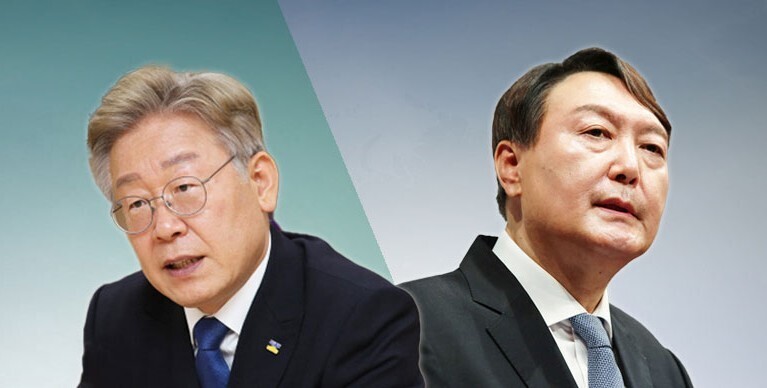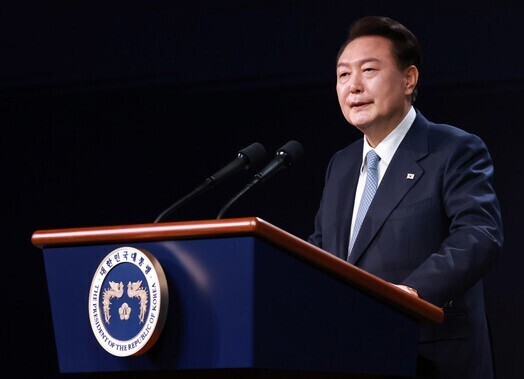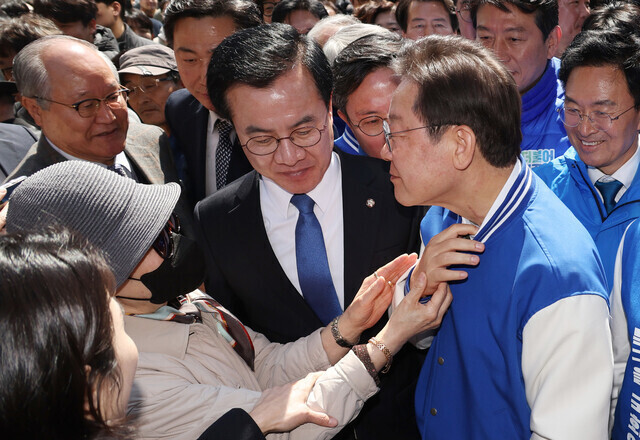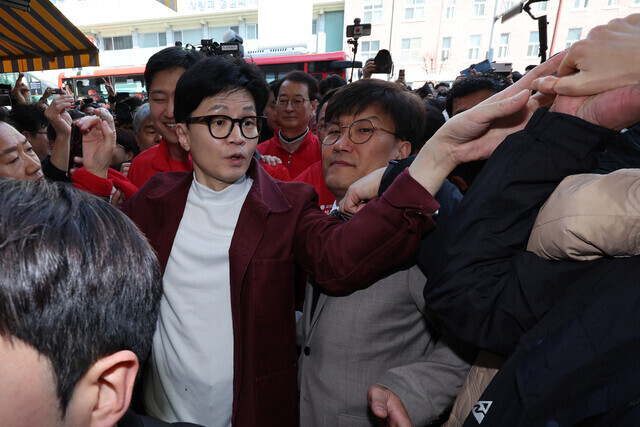hankyoreh
Links to other country sites 다른 나라 사이트 링크
Understanding Korea’s general elections: With enemies like these, who needs friends?

In “Dynamic Korea,” one of the biggest forces in politics appears to be the advantage gained from the other side’s mistakes.
Things had been looking bleak for the Democratic Party, which had suffered a string of defeats, first in the presidential election in March 2022, and then in the local elections and by-elections on June 1 of that year. The party, with Lee Jae-myung at the helm, seemed to have little chance of prevailing in the general elections scheduled for April 10 of this year.
And then a figure emerged to rescue the Democratic Party from that crisis — none other than President Yoon Suk-yeol, Lee’s archnemesis. Yoon pardoned Kim Tae-woo, the disgraced mayor of Seoul’s Gangseo District, restored his right to run for office, and then had him nominated to run for his old post as mayor in a by-election on Oct. 11, 2023.
Voters punished the Yoon administration for its arrogance and nonsensical behavior as Jin Gyo-hoon, candidate for the Democratic Party, trounced Kim Tae-woo by a margin of 56.52% to 39.37% in the by-election. That kindled hope inside the Democratic Party that it might have a chance of winning in the general elections, too. That’s also when people began to suggest that the electorate might hold the Yoon administration responsible for its blunders in the elections.
Lee manipulates primaries in attempt to dominate the party
Lee Jae-myung’s escape from disaster meant that Yoon was now headed for disaster himself. So the president opted for a desperate gambit. He had his close ally, Justice Minister Han Dong-hoon, named interim leader of the People Power Party (PPP), eroding his current power base in favor of cultivating Han’s future power base.
The gambit paid off, since Han managed to rally the PPP’s base. Han also found a way to judiciously criticize first lady Kim Keon-hee for her controversial acceptance of a luxury bag, in apparent violation of Korea’s anti-graft laws.
Now it was Lee Jae-myung’s turn to benefit his rival Yoon.
Lee saw the upcoming general elections as an opportunity to fill the National Assembly with Democratic Party lawmakers who were loyal to him. Toward that end, he had the party raise the share of current lawmakers penalized for poor performance from the lowest 10% to the lowest 30% in the party’s review of lawmaker performance.
Lee also ensured his personal control over the process by appointing Im Hyuk-paik as chair of the nomination management committee, Ahn Gyu-back as chair of the strategic nomination management committee, Cho Jung-sik as secretary-general and Kim Byung-kee as senior deputy secretary-general.
The clash over the nominations began with Im’s remarks on Feb. 6 about the need for those who had helped Yoon Suk-yeol become president to take responsibility for their role. There were soon numerous reports that lawmakers suspected of having voted in favor of a bill stripping Lee Jae-mung’s parliamentary immunity and clearing the way for an arrest (that ultimately did not occur) ranked among the lowest 10% or 20% in the lawmaker performance review.

That clash came to a head on Feb. 19 with the decision by Kim Young-joo, the deputy speaker of the assembly, to leave the Democratic Party. Numerous sitting lawmakers who were not aligned with Lee Jae-myung — including Lim Jong-seok, Hong Young-pyo, Park Kwang-on and Shin Dong-geun — were eliminated from contention during the party’s review of candidates and the subsequent primaries.
Anybody could tell that Lee was engineering total control over the party and pushing aside anybody who disagreed with him.
The coup de grace in the Democratic Party’s nomination shenanigans was the contest between current lawmaker Park Yong-jin and Cho Su-jin, an attorney. Despite the highly unfair nature of the primary, Lee himself stepped in to “confirm the kill,” so to speak, remarking that “it’s time to wrap up the discussion” while announcing the two candidates’ share of the vote. But Cho ended up resigning her candidacy on the very day when the final nominees were supposed to be registered.
Nemesis to the rescue
After over a month of infighting among Democratic Party members over nominations and appointments, the people turned their backs on the party and its leader. Party lawmakers based in the greater Seoul area were lamenting that the party’s representation in the National Assembly would plummet to 120 seats.
Yet once again President Yoon Suk-yeol came to the rescue of the Democrats.
Out of nowhere, Yoon appointed former Defense Minister Lee Jong-sup to be the new ambassador to Australia in early March. Lee was embroiled in allegations that he meddled with a Marine Corps investigation into the death of a marine during flood rescue operations. Moreover, a travel ban had been placed on Lee by the Corruption Investigation Office for High-ranking Officials (CIO). The Justice Ministry then rushed to lift the exit ban, just in time to let Lee out of the country. People mockingly referred to the former defense minister as “Run Jong-sup” and “Getaway Ambassador.”
Hwang Sang-moo, Yoon’s senior presidential secretary for civil society, resigned after reports emerged that he jokingly referred to a stabbing of a journalist in the 1980s while addressing MBC reporters. Yoon did not cede to the demands of PPP leader Han Dong-hoon, who called for the resignations of Hwang and Lee. The “Lee Jong-sup risk” combined with the “Hwang Sang-moo” risk to form the “Yoon Suk-yeol” risk, which spread into the risk of losing parliamentary seats in the upcoming general election.
The blowback caused by Lee and Hwang was exacerbated by internal disputes over nominations for proportional representation within the People Future Party, a satellite party of the PPP. There was now a clear rift between Yoon and Han, the acting leader of the ruling party. The Chosun Ilbo was worried enough to place the issue on its front page.
“Another rift between Yoon and Han, 3 weeks before general election,” read the front page of its March 19 edition.
“Han says Yoon administration plans will be over if PPP loses in general election,” read another headline one day later.
As Yoon struggled to retain a grip, public support for the People Power Party plummeted. It wasn’t until he was exposed to the criticism of Kim Eun-hye, his former spokesperson, and Lee Yong, his former chief of staff, that Yoon summoned the Australian ambassador to return to Seoul and called on Hwang to resign. The president couldn’t take any more heat.

As if being Lee Jae-myung’s savior weren’t enough, on March 18, Yoon visited a grocery store in Seoul’s Yangjae neighborhood, where he remarked that “875 won for green onions seems reasonable.” The comment left a bitter taste in the mouths of consumers and farmers struggling with inflation and high prices.
Lee Jae-myung smelled blood. The Democratic Party leader visited a grocery store in Incheon’s Michuhol District and checked the prices of green onions.
“Has anybody ever seen green onions selling for just 850 won? Look! It’s more like 5,000,” Lee remarked.
“The current administration clearly has no interest in the actual living conditions of the people.”
It was as if Yoon and Lee had rehearsed the whole thing to make Lee look good.
The general election is just around the corner on April 10. How many times will Lee and Yoon paradoxically save each other before then? It’s a strange relationship, one that’s hard to put into words. It’s hard to find a description more suitable than “hostile symbiosis.” They’re pitted in a fierce battle against each other, yet it’s that very battle they rely on to survive. So what makes this hostile symbiosis possible?
Thriving off emotional division
Political polarization explains a lot of what’s happening. The polarization we’re seeing essentially started in the US and Europe, sparked by technological revolutions of mobile technology and social media. The election of Donald Trump in 2016 and the Brexit vote are two results of this political polarization. The rematch between Biden and Trump is just a continuation of this phenomenon.
The more extreme political polarization becomes, the less relevant the conventional political grammar. For instance, there’s the classic campaign strategy of appealing to the support base during the primaries, and then shifting focus to the general public during the main election. But in a situation of extreme polarization, the objective of an election isn’t to select a candidate that will represent the people. The goal is to find someone who can topple the opposition and bring home a victory for the party. The “spin doctors” on both sides of the aisle direct their energy on demonizing the opposition, feeding off the rage and hatred of their support base to drive them to the voting booths. The “politics of hate” are now a foundational campaign strategy.
This is exactly what happened during the South Korean presidential election in March 2022. From the primaries onward, both camps relied on rancorous politics. On both sides of the spectrum, voters made their selections based not on “Who will be the best president?” but on “Who is the best bet to defeat the opposing side?” And that’s how we ended up with Lee Jae-myung and Yoon Suk-yeol. On both sides of the race, we had villains.
As the presidential election drew closer, voters for both parties exhibited levels of unprecedented hatred for the opposing side. A poll conducted by Gallup Korea in February 2022 showed that around 95% of voters on each side felt a “strong dislike” for the candidate of the opposing party. A lot of voters responded that they were simply voting for Yoon because they couldn’t bear the thought of Lee becoming president — and vice versa.
The biggest tragedy resulting from polarization is that neither side truly accepts the victory of the other. To them, the face on the other side of the aisle is akin to the devil or absolute evil. Why would they accept such a malignant force as their president? As soon as the presidential election was over, supporters of the PPP called for Lee to be imprisoned. A faction of Democratic Party supporters held rallies calling for the impeachment of Yoon — right after he was elected.

Politicians also fall victim to the sorcery of polarization. Even if a politician is victorious in an election, they can’t truly enjoy that victory on an emotional and psychological level. Naturally, they do not view their opposition as colleagues. Dialogue and compromise — normally the crux of a constitutional democracy — are thrown out the window. Politicians even go so far as to openly despise voters who selected the opposition. Yoon didn’t use phrases like “the vested interest cartels” or “pro-North Korean commies” out of levity. He was serious. The same goes for Lee, who referred to Yoon supporters as “incels.”
The language of Han Dong-hoon and Lee Jae-myung, respective leaders of Korea’s two major parties in the run-up to the general election on April 10, is also becoming increasingly coarse.
“We need to prevent the alliance between the Unified Progressive Party descendants and the criminals from taking over this country,” said Han Dong-hoon on March 21 during a visit to Seomun Market in Daegu.
“Let us bestow judgment on the despot who denies the history of the May 18 Democratization Movement, on that insane band of traitors,” said Lee Jae-myung the same day during a visit to the May 18th National Cemetery.
Does this rhetoric not send shivers down your spine? This is not normal.
But my greatest fear is what comes after the election. If things continue on their current course, it won’t matter who wins — it’s all too possible that the loser simply won’t concede. This pseudo-civil and psychological war we’re currently living through may not end on April 10.
It seems the likely scenario that Korea will head into the local elections in 2026 and the presidential election the following spring having been cleaved clean in half, without any of the issues that truly threaten the existence of the country and the lives of Korean — population decline, disappearance of rural communities, North Korea’s nuclear program — having been resolved in the slightest.
The path we’re on appears headed toward Korea’s downfall. Are we helpless to stop this runaway train?
By Seong Han-yong, senior politics writer
Please direct questions or comments to [english@hani.co.kr]

Editorial・opinion
![[Column] Season 2 of special prosecutor probe may be coming to Korea soon [Column] Season 2 of special prosecutor probe may be coming to Korea soon](https://flexible.img.hani.co.kr/flexible/normal/500/300/imgdb/original/2024/0426/3317141030699447.jpg) [Column] Season 2 of special prosecutor probe may be coming to Korea soon
[Column] Season 2 of special prosecutor probe may be coming to Korea soon![[Column] Park Geun-hye déjà vu in Yoon Suk-yeol [Column] Park Geun-hye déjà vu in Yoon Suk-yeol](https://flexible.img.hani.co.kr/flexible/normal/500/300/imgdb/original/2024/0424/651713945113788.jpg) [Column] Park Geun-hye déjà vu in Yoon Suk-yeol
[Column] Park Geun-hye déjà vu in Yoon Suk-yeol- [Editorial] New weight of N. Korea’s nuclear threats makes dialogue all the more urgent
- [Guest essay] The real reason Korea’s new right wants to dub Rhee a founding father
- [Column] ‘Choson’: Is it time we start referring to N. Korea in its own terms?
- [Editorial] Japan’s rewriting of history with Korea has gone too far
- [Column] The president’s questionable capacity for dialogue
- [Column] Are chaebol firms just pizza pies for families to divvy up as they please?
- [Column] Has Korea, too, crossed the Rubicon on China?
- [Correspondent’s column] In Japan’s alliance with US, echoes of its past alliances with UK
Most viewed articles
- 1‘We must say no’: Seoul defense chief on Korean, USFK involvement in hypothetical Taiwan crisis
- 2[Editorial] Korea’s surprise Q1 growth requires objective assessment, not blind fanfare
- 3[Column] Season 2 of special prosecutor probe may be coming to Korea soon
- 4Is Japan about to snatch control of Line messenger from Korea’s Naver?
- 5Division commander ordered troops to enter raging flood waters before Marine died, survivor says
- 6No good, very bad game for Korea puts it out of Olympics for first time since 1988
- 7S. Korea “monitoring developments” after report of secret Chinese police station in Seoul
- 8The dream K-drama boyfriend stealing hearts and screens in Japan
- 9[Column] ‘Choson’: Is it time we start referring to N. Korea in its own terms?
- 10Is N. Korea threatening to test nukes in response to possible new US-led sanctions body?